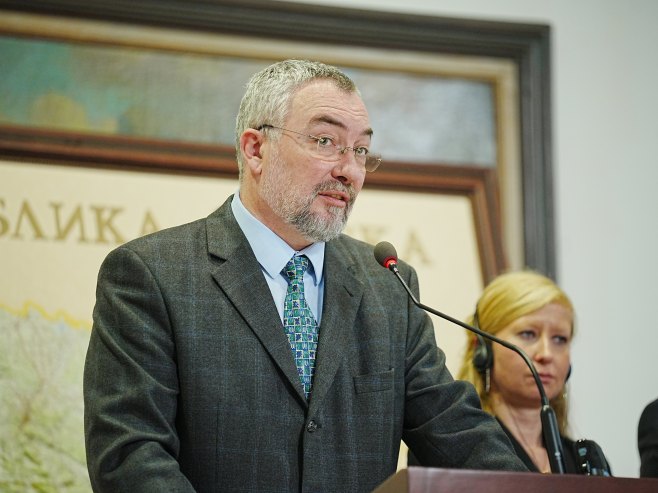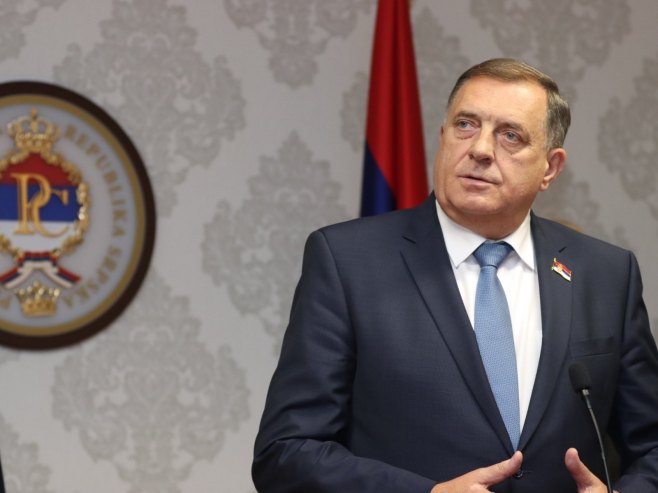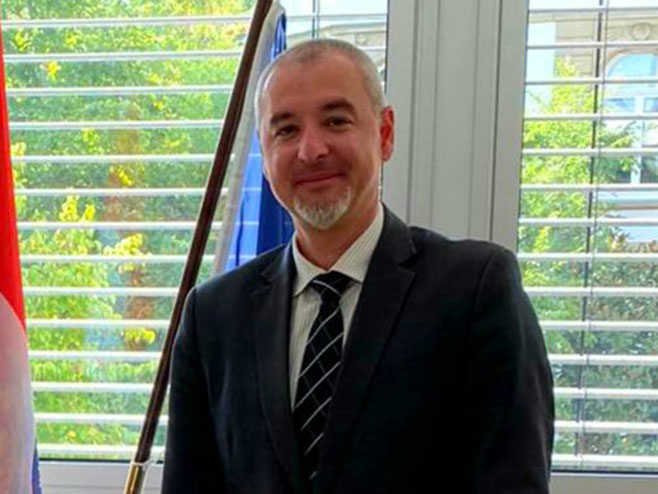The Director of the Center for Socio-Political Research (CDPI) of the Republic of Srpska, Dušan Pavlović, stated that the German diplomat Christian Schmidt is increasingly and more brazenly behaving like a Nazi German gauleiter. Pavlović added that this may not be surprising, given Schmidt’s openly proven affiliation with and support for Nazi structures in his home country, as confirmed by German media.
Pavlović stated that what is more surprising and concerning is the open support for such “manners” and actions of the German diplomat by the U.S. Ambassador to Bosnia and Herzegovina, Michael Murphy, and official Germany – the home country of this “gauleiter in the making.”
According to Pavlović, Schmidt’s announcement on the OHR website, despite not being appointed by a UN Security Council resolution, and his unilateral attempt to annul the conclusions of the National Assembly of the Republic of Srpska, represents a serious violation of the basic principles of international law, as well as the General Framework Agreement for Peace in Bosnia and Herzegovina.
This act, Pavlović added, jeopardizes not only the constitutional order of Bosnia and Herzegovina but also the integrity of the international treaty that is crucial for maintaining peace and stability in the region.
“The Dayton Agreement and all its annexes hold the unique status of an international treaty that is binding for all contracting parties. The agreement was verified by the UN Security Council through the adoption of Resolution 1031, which not only confirmed the importance of the agreement but also proclaimed the international obligation to respect the Dayton Agreement and all annexes, which also hold international legal status. The contracting parties, the Republic of Srpska and the Federation of Bosnia and Herzegovina, retain special rights and obligations regarding the interpretation and implementation of the Agreement,” stated the CDPI document “Challenges of Serbian Public Policy“ as highlighted by Pavlović.
Pavlović emphasized that Annex IV of the Agreement, also an international treaty functioning as the Constitution of Bosnia and Herzegovina, guarantees the autonomy of the entities, as well as the equality of the three constituent peoples.
“The National Assembly of the Republic of Srpska, as the highest legislative body of Srpska, in accordance with its constitutional competencies and obligations as one of the contracting parties, has the right and duty to protect the constitutional and legal order of the Republic of Srpska, which is directly based on Annex IV. Its decision to adopt conclusions defending the international legal status of the General Framework Agreement for Peace in Bosnia and Herzegovina is not only legitimate but also obligatory, as the Republic of Srpska has an international obligation to protect the integrity and implementation of all parts of this agreement,” Pavlović stressed.
Pavlović stated that Schmidt’s attempt to annul acts passed by the National Assembly of Republika Srpska directly contradicts the fundamental principle of international law pacta sunt servanda, which establishes that all treaties must be honored in good faith.
“Schmidt’s actions undermine the legal equality of the contracting parties, violate the constitutional structure of Bosnia and Herzegovina, and attack the legislative autonomy of the National Assembly of Republika Srpska. By doing so, this German diplomat discriminates against Serbs – one of the constituent peoples of Bosnia and Herzegovina – and threatens their guaranteed rights under the international agreement, specifically Annex IV. This endangers the principle of equality among peoples in Bosnia and Herzegovina,” Pavlović emphasized.
He believes that Germany, as Schmidt’s home country, bears significant responsibility for his actions.
“By using his German diplomatic status and the support of his government, Schmidt acted against international law and disrupted Bosnia and Herzegovina’s constitutional order. Germany, as one of the countries responsible for supporting the implementation of the General Framework Agreement for Peace in Bosnia and Herzegovina, is obligated to ensure that its representatives do not act in violation of international legal norms,” Pavlović said.
He stressed that such actions by Germany could be interpreted as complicity in violating a binding international agreement, thereby directly threatening the sovereignty and constitutional order of Bosnia and Herzegovina.
Additionally, Pavlović pointed out that actions undermining the principles of the Dayton Agreement represent a form of neo-colonialism toward Bosnia and Herzegovina, which is unacceptable in modern international relations.

Germany must publicly distance itself from Schmidt
“In order to rectify this highly compromising situation, Germany must take concrete steps:
- Publicly distance itself from Christian Schmidt’s actions that contradict the General Framework Agreement for Peace in Bosnia and Herzegovina.
- Withdraw support for his decisions that violate Bosnia’s constitutional order and the rights of its entities.
- Re-evaluate Schmidt’s diplomatic status and ensure that his future actions align with international law.
- Provide guarantees to all parties in Bosnia and Herzegovina, including Republika Srpska, that Germany will respect and support the implementation of the General Framework Agreement for Peace in Bosnia and Herzegovina in its original form,” Pavlović said.
He emphasized that Republika Srpska, as one of the signatories of the General Framework Agreement for Peace in Bosnia and Herzegovina, has not only the right but the obligation to consistently adhere to and protect this international peace agreement, including all annexes, which also hold international legal status.
“Republika Srpska’s actions in this context represent a legitimate and legally grounded response to attempts to undermine the constitutional order and autonomy,” Pavlović said.
He underscored that the General Framework Agreement for Peace in Bosnia and Herzegovina is not merely a historical document that ended armed conflict but also the legal foundation that ensures peace, stability, and equality in Bosnia and Herzegovina.
“Violations of its provisions by any actor – whether domestic or international – pose a danger to the entire country and region. In this sense, Republika Srpska may represent a key factor in stability within Bosnia and Herzegovina, as well as the region, through its decades-long efforts to preserve and correctly implement this international peace agreement,” Pavlović concluded.
4









